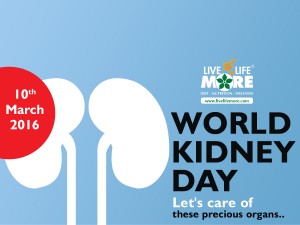10th March, 2016 is being observed as World Kidney Day…Let’s care for these precious organs….
Get alarmed and consult your doctor….if you experience itching, muscle cramps, swelling in your feet and ankles, or pass too much urine or not enough urine. These may indicate some problem in your kidneys.
Prevention as they say is better than cure…
Few tips for reducing your risk of kidney disease…
What do kidneys do?
Most of us are born with two bean-shaped kidneys. The kidneys filter 200 liters of blood, remove 2 litres of toxins, wastes and water in the process. The body wastes and water ultimately leave the body as urine, and through this process, kidneys are able to regulate the body’s fluid levels. The kidneys also release hormones that regulate blood pressure, produce red blood cells and help maintain healthy bones. Kidney damage progresses slowly over time, which is one of the reasons why one might not “feel sick” until the kidneys are failing, making awareness, prevention and early detection of kidney disease critical. Protect your kidneys by following these tips for reducing risk of kidney disease.
1. Regular Investigations. All with diabetes, hypertension and a history of kidney disease, must get the kidneys checked from time to time. There are two simple tests to check for kidney disease:
• A urine test for albumin, a type of protein. Protein in the urine is one of the earliest signs of kidney damage. When there is too much protein in the urine, it means that the kidneys’ filters have been damaged and are starting to leak protein.
• A blood test for creatinine. Creatinine is a waste product (from muscle metabolism) that is removed by the kidney. Creatinine levels are used to calculate your estimated glomerular filtration rate (eGFR). The eGFR reflects how well the kidneys are filtering wastes from the blood.
2. Optimum control of blood pressure and blood sugar levels.The kidney contains many blood vessels. Therefore, diseases that damage the blood vessels, including high blood pressure and diabetes, can damage the kidneys. Even “slightly” high blood pressure (pre-hypertension)over a period of time and elevated blood sugar levels, commonly referred to as “pre-diabetes,” can damage the kidneys.Control these conditions to protect your kidneys.
3. Maintain a healthy body weight. Maintaining a healthy weight is important for your kidneys. Extra bodyweight means that the kidneys have to work harder to filter out toxins and to meet the metabolic demands of the increased body mass. Obesity also increases your chance of developing diabetes and high blood pressure, which are two major risk factors for kidney disease. Weight loss can help reduce your risk.
4. Quit Smoking. Smoking causes more harm to kidneys than conditions like diabetes and high blood pressure. Quitting is one of the most important lifestyle changes that you can make to protect your kidneys and impact your overall health.
5.Dietary Recommendations and Restrictions. Making good choices each day such as incorporating physical activity and eating healthy foods will reduce your risk of developing kidney disease. Reduce your salt intake and watch for high sodium levels in processed foods, as these can lead to high blood pressure and harm the kidneys.
6. Avoid taking too many pain relievers. Taking over-the-counter pain relieving medications are filtered by the kidneys. Kidneys break down and remove these medications from the body. Avoid excessive use of medications that can harm the kidneys.
So, stay blessed and Live Life More with healthy kidneys.




